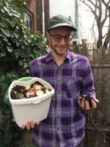How these Massachusetts farmers are turning manure and food waste into power
https://www.youtube.com/watch?time_continue=100&v=bmX1sowEo8g&feature=emb_logo While I'm a fan of keeping organic materials out of the landfill, I'm not a fan of burning methane, either. Notice there's no mention of finished compost from this process? Therefore, this process is totally misleading by calling itself "renewable". If you're converting organics into methane gas and then burning it, the organics are now gone for good (not renewable). There's no compost resulting from this process that would then be able to grow more food. Better than landfills, better than incineration, but not good enough.
